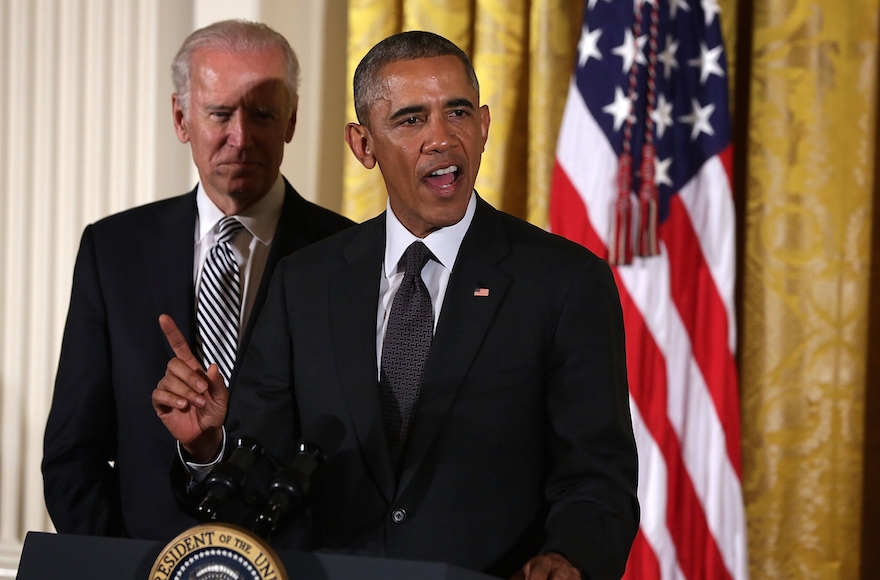(JTA) — In her victory speech after the Nevada primaries, Democratic hopeful Hillary Clinton said it’s time to invest in marginalized communities by “ensuring that people with disabilities have the same opportunities to work and fully participate in our society.”
That may seem like the standard campaign rhetoric of a serious presidential candidate, but what many people don’t realize is that disability rights have rarely been mentioned by name in national campaigns.
Fortunately, Clinton is not alone. Sen. Bernie Sanders, another Democratic candidate, has also urged the full inclusion of people with disabilities in society. Among the Republican hopefuls, Gov. John Kasich of Ohio has named workers with disabilities as a target for programs to increase employment. Jeb Bush, before ending his run for the nomination recently, had featured a child with a disability in a campaign video. The video followed a campaign speech in which Donald Trump made jerky movements that mocked Serge Kovaleski, a reporter with a disability that restricts the mobility of his arms, prompting a widespread public outcry.

Jay Ruderman (Noam Galai)
While pundits don’t agree on how much such rhetoric lines up with voting records and possible presidential initiatives, at the end of the day, the rhetoric of inclusion is in and of itself important. It is important for our society to hear political candidates say, as Sen. Marco Rubio did last month, that “Most countries in the world, if you are disabled or you are born with a disability, you never go to school. They basically write you off and walk away. We have never done that and we will never do that.” And it is important for people to hear that Sen. Ted Cruz finds the fact that 70 percent of people with disabilities are unemployed appalling and wants to change that number, as he said last November.
During this year’s contentious race for the White House, especially on the eve of the Super Tuesday primaries on March 1, it is rare to find an issue that cuts across our bitter party lines, but disability inclusion is precisely such an issue.
READ: What Jews with disabilities can teach the rest of us
The bipartisan embrace is evident in the fact that the ABLE Act, which allows families to set aside tax-free money to support family members with disabilities, passed with overwhelming support from both parties in 2014. Furthermore, a quarter-century ago, Republican President George H.W. Bush proudly signed into law the Americans with Disabilities Act, or ADA, a seminal piece of legislation that changed the lives of people with disabilities.
Fast forward to Feb. 10, and the most passionate legislators to address the Jewish Disability Advocacy Day on Capitol Hill included Rep. Jim Langevin, a Rhode Island Democrat and a person with a disability, and Republican Reps. Cathy McMorris Rodgers of Washington and Gregg Harper of Mississippi, each of whom has a child with a disability.
If you are cynically inclined, you may think this is just to win votes. But consider a White House gathering last week on the Jewish community and disability inclusion. The event was organized jointly by Maria Town and Matt Nosanchuk, the White House liaisons on disability issues and the Jewish community, respectively. In all likelihood, President Barack Obama will never face another election and does not need anyone’s vote, yet his administration continues to champion disability rights, including within the context of outreach to American Jews.
We will not always agree on the concrete ways to achieve change, but this inclusion climate is certainly a long way from when Franklin D. Roosevelt ran for president while hiding the fact that he had a disability. The fact that political candidates now believe that disability inclusion will earn them votes is a reflection of the nationwide change in attitudes toward people with disabilities. There has been a growing awareness that Americans with disabilities are the largest minority in our country, accounting for 20 percent of the population, and that this minority needs to be included in everyday life.
But despite the immense progress we have made, the cause of disability inclusion is not about one state primary or caucus. It’s about actions and attitudes that continue long after the news cycle ends. For us in the Jewish community, which has made great strides in our messaging and in our policies, let’s not forget that we have not yet reached our goal. People with disabilities remain one of the most systematically segregated and marginalized minorities in our country.
READ: Twitter discussion #Parshachat merges Torah talk and the disability experience
As thought leaders and – on a good day – as role models, presidents, candidates and members of Congress can impact our thinking and our actions. Even the best-intentioned candidate may find it daunting to implement new policies once in office. As American Jews, we can draw inspiration from the increased visibility for our community and for the disability cause. Then we must turn around and push our leaders – and American society – to do even better.
If we can accomplish this, we will truly win hearts and minds for a cause that’s both inherently Jewish and American.
(Jay Ruderman is the president of the Ruderman Family Foundation, which focuses on the inclusion of people with disabilities into society. Follow him on Twitter @jayruderman.)

Help ensure Jewish news remains accessible to all. Your donation to the Jewish Telegraphic Agency powers the trusted journalism that has connected Jewish communities worldwide for more than 100 years. With your help, JTA can continue to deliver vital news and insights. Donate today.






